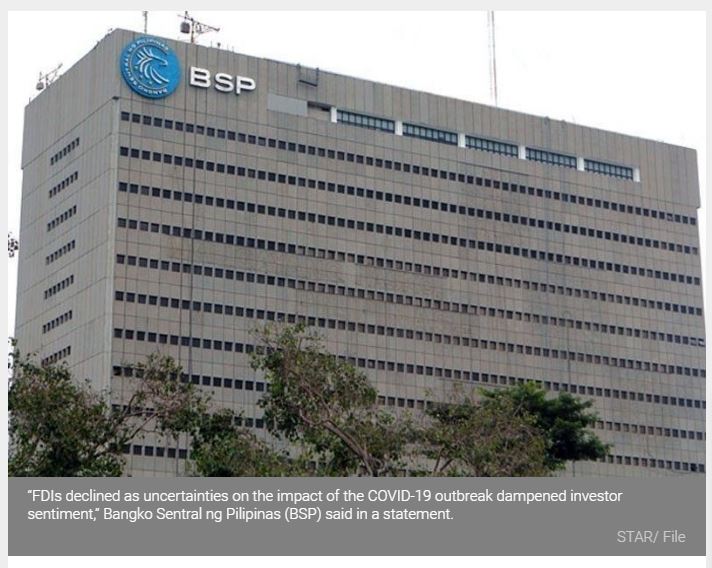Philippines: FDI lowest in 6 months
MANILA, Philippines — The net inflow of foreign direct investments (FDIs) fell 31.5 percent to a six-month low of $505 million last February from $737 million in the same month a year ago, prompting the Bangko Sentral ng Pilipinas (BSP) to cut its target by more than half as uncertainties brought about by the coronavirus disease 2019 or COVID-19 pandemic dampened investor sentiment.
“FDIs declined as uncertainties on the impact of the COVID-19 outbreak dampened investor sentiment,” Bangko Sentral ng Pilipinas (BSP) said in a statement.
The net FDI inflow in February was the smallest in six months or since the $430 million recorded in August last year. The inflow has also declined for the third straight month since the $1.15 billion recorded last December.
Preliminary data released by the central bank showed equity infusions plunged by 45.2 percent to $145 million in February from $265 million in the same month last year, while withdrawals fell by 58 percent to $16 million from $38 million.
BSP said equity capital placements mainly came from the Singapore, Japan, and the US that were channeled to the manufacturing, real estate, as well as wholesale and retail trade industries.
On the other hand, reinvestment of earnings declined by 16 percent to $59 million from $80 million, while non-residents’ investments in debt instruments consisting mainly of loans extended by parent companies abroad to their local affiliates plunged by 44.1 percent to $317 million from $431 million.
For the two-month period, the central bank said net FDI inflow declined by 12.2 percent to $1.16 billion from $1.32 billion as equity placements grew by 14.9 percent to $519 million, while outflows plummeted by 86.1 percent to $37 million.
Net FDI inflow dropped 23.1 percent to $7.65 billion last year from $9.95 billion in 2018 as global uncertainties, as well as the delayed passage of the second tranche of the government’s tax reform program dampened investor sentiment, notwithstanding the country’s sound macroeconomic fundamentals.
BSP is now expecting FDIs to drop by 46.4 percent to $4.1 billion instead of increasing by 15 percent to $8.8 billion this year.
Fitch Solutions Country Risk & Industry Research said in a commentary titled, “COVID-19 poses challenges to Philippines’ FDI outlook,” the health crisis would aggravate the challenges the country is facing in attracting more investments.
“The COVID-19 pandemic is likely to weigh on the FDI outlook for the Philippines over the coming quarters,” it said.
FDIs reflect longer-term investments that are less liquid than other forms of hot money or speculative fund inflows and support the development of sectors, infrastructure and a country’s financial system.
“We expect the impact of the virus to disrupt FDI inflows into the country due to a combination of weaker foreign balance sheets and the shock to investor confidence and global growth,” Fitch Solutions added.
It said the global virus outbreak would aggravate the already notable structural barriers that deter investment into the Philippines, including logistics, an uncertain policy backdrop, weakening the longer-term outlook for both growth and the country’s exporting capabilities.
“The shock to the economic outlook will curb FDI in the near term. FDI inflows had already dropped 23.1 percent in 2019 and we expect inflows to remain depressed in 2020,” it said.
The Philippines has failed to capitalize on the relocation of manufacturing from China spurred by the trade war between Washington and Beijing as investors opted to go to either Vietnam or Taiwan.
Source: https://www.philstar.com/business/2020/06/12/2020272/fdi-lowest-6-months


 Thailand
Thailand




